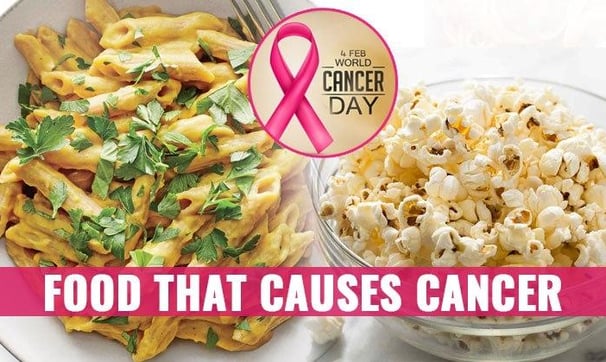Top Foods Increasing Risk Of Cancer


Many research have looked at the potential that certain dietary components or nutrients are connected with an increase or decrease in cancer risk. Laboratory studies of cancer cells and animal models have occasionally revealed evidence that isolated chemicals are carcinogenic.
However, with rare exceptions, human population studies have failed to conclusively demonstrate that any dietary component causes or protects against cancer. Epidemiologic research comparing the diets of persons with and without cancer have occasionally revealed that people with and without cancer consume different amounts of a certain dietary component.
However, these findings merely demonstrate that the dietary component is related with a change in cancer risk, not that it is responsible for or causes the change in risk. For example, research participants with and without cancer may differ in ways other than food, and it is conceivable that another factor explains the difference in cancer.
When epidemiologic research suggests that a dietary component is related with a lower risk of cancer, a randomised trial may be conducted to test this hypothesis. Random assignment to dietary groups guarantees that any differences between participants with high and low nutrient intakes are caused by the nutrient itself, rather than any unidentified variations. (When data suggests that a dietary component may be linked to an elevated risk of cancer, randomised trials are typically avoided for ethical grounds.
Many additives, minerals, and other dietary components have been investigated for their potential links with cancer risk. This includes:
Acrylamide
Acrylamide is a molecule present in tobacco smoke and some foods. It may be generated by heating some foods, like as potatoes, to high temperatures. Animal studies have shown that acrylamide exposure raises the incidence of various forms of cancer. However, there is no consistent evidence that dietary acrylamide intake is linked to the risk of any kind of cancer in people. For further information, consult the Acrylamide and Cancer Risk fact sheet.
Alcohol
Although red wine is said to reduce the incidence of cancer, there is no scientific evidence to support this claim. Alcohol is also a proven carcinogen. Heavy or frequent alcohol drinking raises the chance of developing malignancies in the oral cavity (except the lips), pharynx (throat), larynx (voice box), oesophagus, liver, breast, colon, and rectum. The chance of acquiring cancer increases as one consumes more alcohol. For further information, please consult the Alcohol and Cancer Risk Factsheet.
Antioxidants
Antioxidants are substances that inhibit the action of other chemicals known as free radicals, which may harm cells. Exogenous antioxidants have been shown in laboratory and animal studies to help prevent the free radical damage associated with cancer development, but human studies have not demonstrated convincingly that taking antioxidant supplements can help reduce the risk of developing or dying from cancer. Some studies even found an elevated risk of some malignancies. For further information, check the Antioxidants and Cancer Prevention fact sheet.
Artificial Sweeteners
There have been several research on the safety of the six FDA-approved artificial sweeteners (saccharin, aspartame, acesulfame potassium, sucralose, neotame, and advantame). In experimental animal trials, these sweeteners have not been shown to induce cancer or other negative health consequences. Most investigations on the relationship between artificial sweetener use and cancer in humans have revealed no increase in risk, while one large cohort study discovered a modest increase in cancer risk among users of various sweeteners. For further information, consult the Artificial Sweeteners and Cancer fact sheet.
Charred flesh
When muscle meat, such as beef, hog, fish, and chicken, is cooked at high temperatures, it produces certain compounds known as HCAs and PAHs. High quantities of HCAs and PAHs can cause cancer in animals, but it is unknown if they cause cancer in people. For further information, refer to the Chemicals in Meat Cooked at High Temperatures and Cancer Risk fact sheet.
Cruciferous Veggies
Cruciferous vegetables include molecules called glucosinolates, which degrade into a number of compounds being researched for potential anticancer properties. Some of these chemicals have demonstrated anticancer activity in cells and animals, while human investigations have yielded mixed results. For further information, consult the Cruciferous Vegetables and Cancer Prevention fact sheet.
Fluoride
Fluoride in water helps prevent and even cure tooth decay. Numerous research on both people and animals have found no link between fluoridated water and cancer risk. For further information, check the Fluoridated Water fact sheet.
Vitamin D
Vitamin D helps the body utilise calcium and phosphorus to build healthy bones and teeth. Both observational studies and randomised trials have investigated potential links between vitamin D blood levels or intakes and cancer. Observational studies have shown some indication that those with greater blood levels of vitamin D may have a decreased risk of colorectal cancer and overall cancer mortality. Most randomised studies have revealed no link between vitamin D supplement usage and cancer risk or death. For additional information, consult the Vitamin D and Cancer fact sheet.
Also Read Top 10 Foods For Healthy Diabetes Diet
